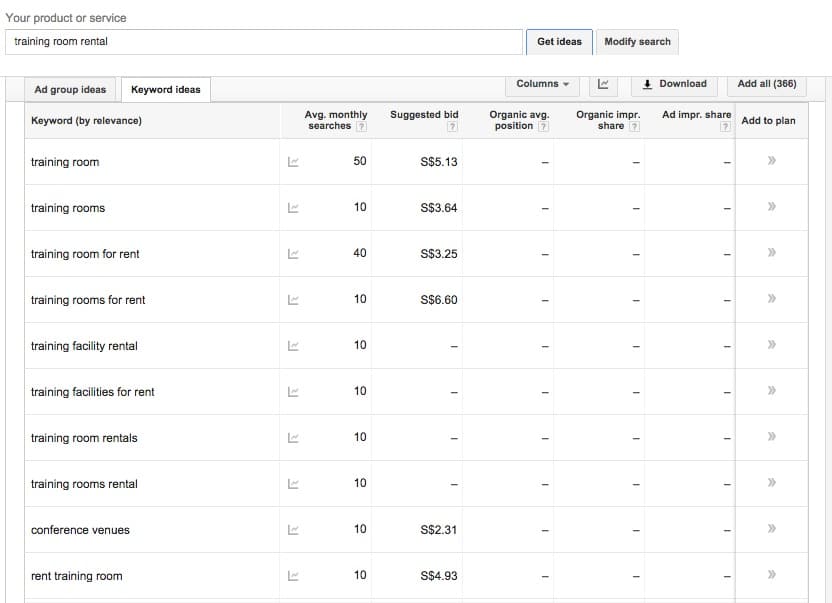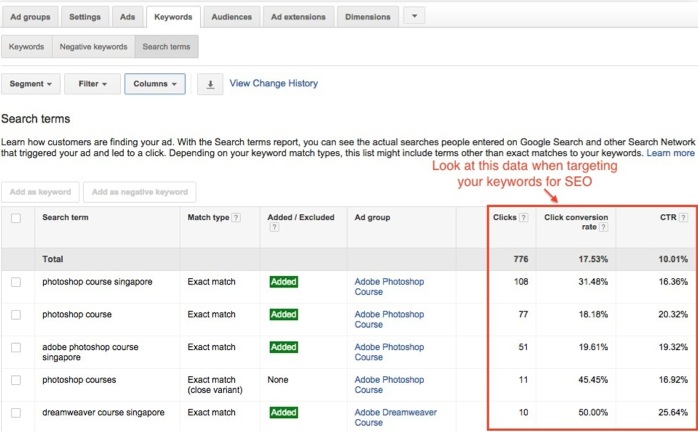4 Pro Keyword Research and Analysis Tips
Keyword research is the process of discovering what your customers are searching for in order to optimise and increase content visibility on the search engine results pages. It’s one of the most important and high return activities in SEO and should be conducted on an on-going basis.
You can (and feel free to) conduct keyword research:
- Before you start a new business
- Before you create a website
- When you’re planning your site architecture
- Whenever you create new content
- Whenever you launch a new product
- Whenever you feel like it (e.g. you feel you’re not receiving enough traffic)
Not sure how to conduct keyword research? Check out our step-by-step guide here.
So Tell Me, What Are The Benefits?
The benefits of conducting in-depth and effective keyword research are immeasurable.
Not all keywords drive you quality traffic. But some do. In fact, some high value keywords can potentially drive dozens of eager buyers to your site on a monthly basis. So imagine how much you might lose out if your keyword research process wasn’t thorough enough.
So what are some measurable benefits that come with effective and in-depth keyword research?
Keyword research helps you discover new buyer personas and understand buyer intent
Just by looking at the incoming search terms to your site, you’ll be able to tell what kinds of people are searching for your products and services and what they’re hoping to find.
Someone searching for “how to shoot beautiful photos” may not necessary be interested in buying a camera, but rather looking for expert tips on taking pretty pictures.
On the other hand, someone searching for “best cameras for shooting outdoor scenery” may be in the comparison phase and would need detailed comparisons on various camera brands before deciding what to buy, whereas someone searching for “second hand canon eos6d cheap” literally has their wallet out.
Keyword research empowers you with useful content ideas
For the first scenario “how to shoot beautiful photos”, we can guess that this person might have already bought a camera and is keen on learning how to shoot beautiful photos, though he/she may not necessarily own the best camera available in the market.
Armed with this information, we can then create a piece of content, say, “How to Shoot Amazing Photos For Beginners”. In this article, we could provide excellent lighting tips on how to shoot beautiful photos even with the most basic camera, and then add that it would really pay off to get a more advanced camera e.g. a DSLR to shoot top quality photos.
By empowering your readers with expert knowledge through targeting useful content to relevant search queries, you’re building their trust in your brand. It would then be much easier to sell them your products and services.
More optimised content
Equipped with a comprehensive list of keywords, you’ll be able to make better decisions when optimising your site by organising your content into individual pages where multiple related keywords are optimised on each page.
Here’s an example of a well-structured site.
As we can see in the above diagram, “Camera Store” and “Camera Brands” should be separate pages, as combining these two topics onto one page would dilute the page’s topical relevancy and result in subpar rankings.
The better practice would be to separate these two pages, including the target keywords e.g. “camera store”, “camera shop” into your “Camera Store” page and “camera brands”, “best camera brands” into your “Camera Brands” page.
In this guide, we’ll cover:
- Why it’s important to identify and understand your buyer personas before and during keyword research
- Types of keywords you should target
- Ways to do keyword research
- How to select the best keywords
Why is it Important to Identify Your Buyer Personas?
Not knowing who you’re marketing your business to is equivalent to firing a gun without aiming at the target board.
People in different stages of the buying funnel type different search queries. As business owners and marketers, we know that customer profiles vary from age, gender, relationship status, problems faced in work and personal life, etc etc.
If you don’t know who your customers are, your keyword research is going to be sloppy and incomplete, from an SEO perspective.
Here’s an example, if you run a business that rents out empty spaces, your target audiences are namely:
- Business consultants looking to hold professional meetings with their clients
- Event planners looking to plan and organise birthday parties
- Influencers looking to run a preview seminar
- Tuition teacher looking to hold tuition classes
- Training providers looking to run workshops and courses
Note: To get the above data, you can conduct market survey, purchase statistical data, and analyse existing customer enquiries and profiles.
Let’s use the second example – the Event planners. To really understand the needs of an event planner, we have to think like one of them. Ask yourself these questions or hold a discussion with anyone who’s throwing a 21st birthday party. What are their concerns and requirements? Remember, you’re an event planner now.
Here’s a list of things that should come up:
- Birthday party ideas
- Venue and location
- Cost
With these ideas, we can generate some keyword-optimised content. For birthday party ideas, we could come up with a listicle “10 Birthday Party Ideas That No One Will Never Forget” and get it ranked for the search term “birthday party ideas”.
As for venue and location, we should optimise our site for commonly used search terms keywords such as “event venue singapore”, “event venue for birthday parties”.
Understanding your buyer personas can give you broad keyword ideas no keyword research tool can. We go further in-depth into buyer personas and how to create them in this article.
Types of Keywords You Should Target
Should we just grab the whole list of keyword ideas generated by your keyword research tool and optimise our site with them? Well you can, however you might be fighting an uphill battle. Some keywords are so competitive that it’s almost impossible to rank on the top 5 positions without some heavy off-page SEO (Content Marketing & Link Building).
First we have to look into which part of the buying funnel your customers are at. Depending on their search queries, they could be in the “Awareness” stage or the “Action” stage. We refer to the AIDA funnel for this.
Again, we’re going to use the venue rental example.
Let’s look at some “Awareness” keyword examples:
How to organize a seminar
How to promote an event
“Interest” keyword examples:
Meeting room facilities
Seminar rooms in [location]
“Desire” keyword examples:
Training room rental rates
Training room rental [more specific location or a brand name]
“Action” keywords examples:
Rent a training room in [location]
Rent a meeting room [location]
As you can infer, “Desire” and “Action” keywords are higher value keywords as they signify a higher level of interest in a particular product or service, therefore we should focus our SEO campaign on targeting these keywords first.
And then there’s short tail, long tail, and location based keywords. Typically we want to target longer tail keywords as they are generally less competitive than short tail/generic keywords. Location based keywords signify a strong interest in a particular location, so if you’re based in that location, you’ve zeroed in on your target audience.
Ways to Do Keyword Research
It’s widely known that keyword research tools (particularly Google Keyword Planner) aren’t fully capable of churning out a comprehensive list of keyword ideas.
Say for example when you enter a seed keyword “training room rental” into Google Keyword Planner, you’d get a broad list of keyword ideas like so:
What you get are a bunch of closely related keyword ideas such as:
- Training rooms
- Training room for rent
- Training facility rental
- Rent training room
What are we missing out then? Let’s find out.
Using another keyword research tool such as Google Suggest on the keyword term “training room rental”, we can discover new keyword ideas that would be close to impossible to find just by entering a seed keyword into Google Keyword Planner.
Check out these keywords suggested by Google:
- Training room rental international plaza
- Training room rental in bugis
- Computer training rooms for rent
If your training rooms were located in International Plaza, your results should be one of the most relevant to the searcher. It matches the searcher intent almost a 100%. Wouldn’t it be a pity if you didn’t optimise your page for this key phrase?
Here are some other recommended keyword research tools:
How to Select the Best Keywords
“Best keywords” is actually a misnomer. The keywords you should optimise your site for depends on:
- How strong your domain authority is (how many authoritative and relevant backlinks you have and how long your website has been around) and how competitive your industry is on Search. Meaning to say you should target less competitive keywords (possibly lower search volume keywords) if your domain authority is not strong enough. You’ll rank much faster for them compared to more competitive keywords.
- Which keywords have the highest chance of converting your visitors to customers (long tail, location based, branded, “Action” keywords).
For the third point, you need to track your conversions through your AdWords campaigns, Webmaster Tools, and Google Analytics goal conversion data.
Here’s a sample screenshot of an AdWords keyword search terms report:
If your site is already ranking for almost all of your longtail, location based, branded, and “Action” keywords, you should move up and optimise for more generic and “Awareness” keywords, as the audience you intend to reach may not initially be interested in purchasing your products and services, but may do so in the longer term.
Wrapping Up
If you’re starting out on a new business venture and you’ve just created a website, the “Best” keywords for you to target at this phase would be long tail, location-based, branded, and “Action” keywords, basically keywords that are less competitive and targeted to an audience who are more likely to convert.
If you’d like to dive into SEO and learn it for your career or business, we offer two great SEO courses at Equinet Academy:
1. Search Engine Optimisation (SEO) Training Course
2. Advanced Search Engine Optimisation (SEO) Certification Course
We also have an array of digital marketing courses taught in-person in Singapore or online.
Dylan Sun is the Founder of Equinet Academy, a SkillsFuture Singapore WSQ-Accredited Digital Marketing training organisation. Passionate in all aspects of Digital Marketing and SEO, he extends his passion to helping people implement effective digital strategies to their businesses. Follow his blog at Equinet Academy to learn more about Digital Marketing.




